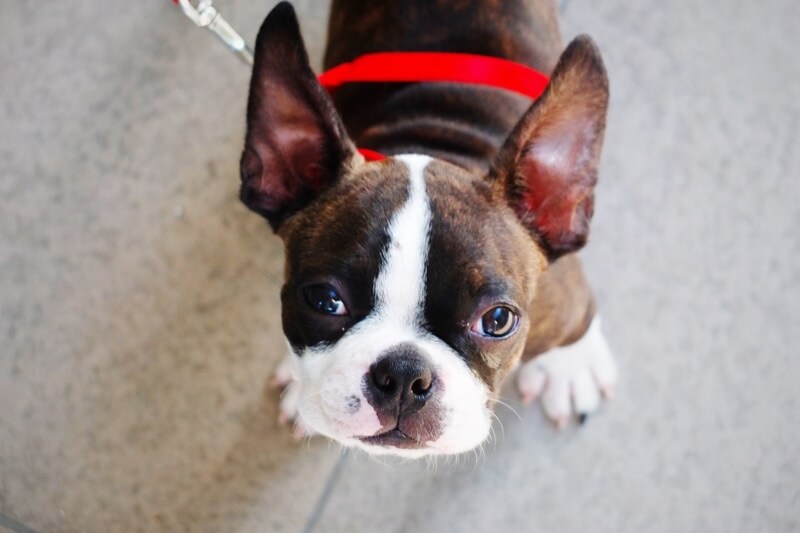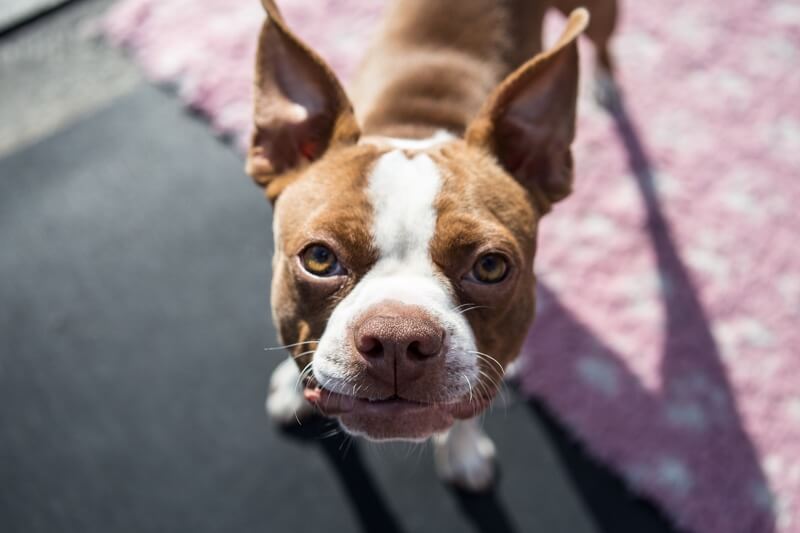From their expressive eyes to their boundless energy, what’s not to love about a Boston Terrier?
Check out these fun facts about this adorable breed:
- An American breed – Boston Terriers were the first breed developed in America—and it’s no surprise which town they called home!
- Stately dogs – This breed was named the state dog of Massachusetts in 1970. Not all states have a designated state dog, so it is a bit of a unique honor.
- Bred for pit fighting – Initially, Boston Terriers were bred for the terrible and violent practice of dog fighting. These dogs were much bigger and stronger than the Boston Terriers that are popular today.
- A luxe look – Boston Terriers got the nickname “the American Gentleman” because they look like they are all dressed up in a tuxedo. So cute!
- Sawing wood – These dogs aren’t big droolers, but they do tend to be big snorers because of the size and shape of their muzzles. They’re prone to grunting and snorting too.
- Gassy pups – Those short muzzles can also cause them to take in a lot of air, which can mean a lot of gas. They’ve been known to clear a room with all that tooting!
- Mistaken identity – Boston Terriers can be confused with French Bulldogs because they look a lot alike. You can tell them apart by their ears. Boston Terriers have pointed ears while French Bulldogs have rounded ones.
- Presidential pooches – President Gerald Ford had two Boston Terriers named Fleck and Spot. Warren G. Harding had one called Hub.
Hopefully, these fun facts have whet your appetite to learn more about this breed!

Boston Terrier Characteristics
Boston Terriers have distinct physical attributes that make them easy to spot in a crowd. They are also known for their sweet and clown-like personalities.
Physical Attributes
These dogs are small and sturdy with a compact build. They typically weigh around 10 to 25 pounds and stand about 16 inches tall. They have short, smooth coats that are white combined with brindle, black, or seal. Brindle is brownish with streaks of other colors. Seal appears white but has a reddish tint when seen in the light. Other attributes include:
- Short, broad muzzles with a white band
- White chest
- Upright ears
- Short tail, which can be straight or curled like a corkscrew
- Large, expressive eyes
Seriously, who could resist smiling when you look into those big eyes!
Personality
While personality has a lot to do with how a dog is raised, these pooches have a personality that precedes them. They are known for their boundless energy and fun-loving ways. They can provide endless entertainment with their silly antics. They are also typically sweet, smart, and easy to train.
Boston Terriers tend to love people and make great dogs for families. They’re on the smaller side, but they are not as fragile as some toy breeds like Pomeranians or Chihuahuas. Children still need to be shown how to play with them safely, but they may be less likely to get hurt by little hands that handle them roughly.
Other than the snoring, grunting, snorting, and tooting, they are on the quieter side. They are not known to be yappy and only bark when they are riled up or hear someone at the door. This can make them a good family watchdog.

How to Care for a Boston Terrier
Boston Terriers are generally healthy and can live up to 15 years or more with proper care. Here are some things you should know about caring for these dogs:
- Their short coats don’t need a lot of attention, but they definitely benefit from regular brushing and an occasional bath.
- They are prone to overheating, so keep a close eye on them in hot weather. Don’t let them play too hard or too long in the heat.
- They also tend to get cold easily. It’s a good idea to put them in a sweater and booties for walks when it is chilly outside.
- Feed them a nutritious diet of high-quality dog food and go easy on the treats. You don’t want your dog to become overweight and at risk for issues like diabetes or joint pain.
- You can supplement their diet with healthy, dog safe fruits and veggies.
- Boston Terriers can be picky eaters. If your dog is not eating enough, talk to your veterinarian about different food options. Your veterinarian might have some food advice for gas issues too.
- Know what not to feed your dog. For instance, grapes, raisins, onions, garlic, chocolate, and foods sweetened with Xylitol are all big no no’s that can cause tummy upset or worse.
- Make sure they get the exercise they need to help burn off their high energy. Exercise also helps avoid boredom or frustration, which can lead to unwanted behaviors like destructive chewing. Luckily, these small dogs don’t need a lot of space to run around!
- Brush those pearly whites and take your dog for an annual teeth cleaning at your veterinarian’s office.
And of course, you should bring your Boston Terrier to the veterinarian for regular visits. You can get cash back for those visits as well as for dental cleanings, vaccines, and more if you have a preventive care coverage option. Oh, and give them lots of love, playtime, and cuddles on the couch too!

Top 10 Accident and Illness Claims for Boston Terriers*
Boston Terriers are prone to respiratory problems because they are flat-faced or brachycephalic dogs, like Pugs, French Bulldogs, or Shih Tzu. The top claims for Boston Terriers include:
Complete CoverageSM offers coverage for all of these conditions and more to help you take great care of your Boston Terrier. Plus, you can customize your coverage to fit your budget and needs. Get started today with a free quote!
*Internal Claims Data, 2016



